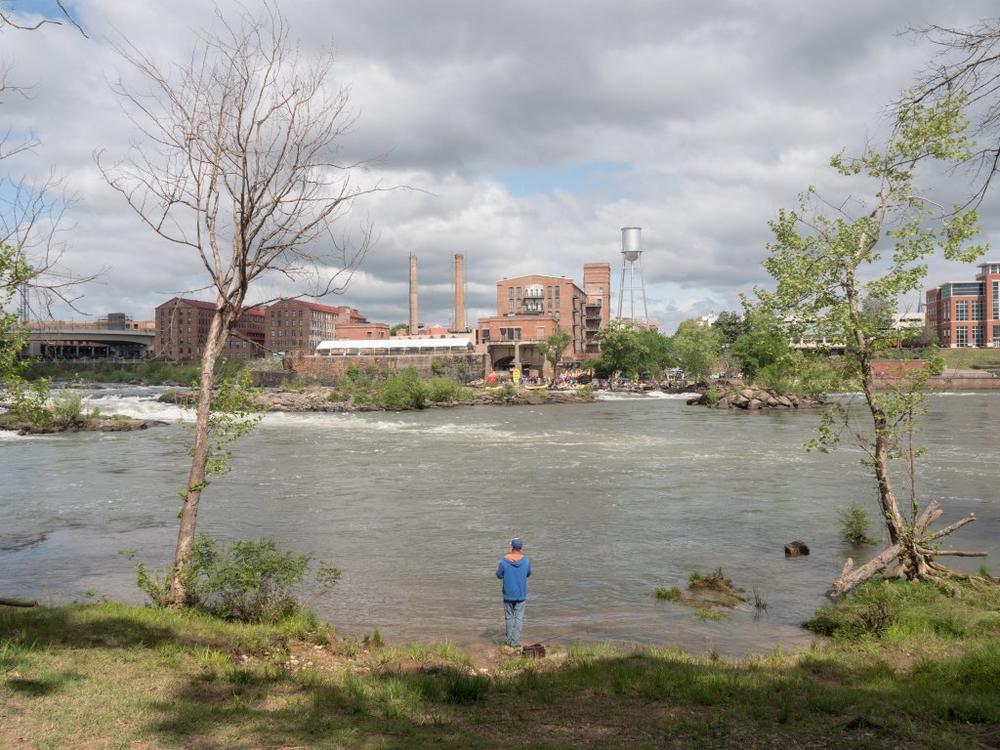
Caption
Georgia and Alabama have agreed to four objectives that include minimum water flow levels at sites in Columbus, Georgia and Columbia, Alabama.
Credit: Henry Jacobs/Chattahoochee Riverkeeper

Georgia and Alabama have agreed to four objectives that include minimum water flow levels at sites in Columbus, Georgia and Columbia, Alabama.
An agreement between the states of Georgia and Alabama in a yearslong water dispute is being celebrated for where it came about: outside of a courtroom.
Governors of the two neighboring Southern states announced in a joint press release this week that they had reached an agreement with the U.S. Army Corps of Engineers, which operates a series of reservoirs in the Apalachicola-Chattahoochee-Flint River Basin.
The massive basin starts in north Georgia and crosses over into Alabama as it moves through southwest Georgia and into the Florida Panhandle. It’s been at the center of the so-called long-simmering water wars, including a Georgia-Florida case that reached the U.S. Supreme Court in which Georgia emerged the victor in 2021.
The proposed compromise must still go through a federal approval process that will include an environmental review and a public comment period. But the state of Alabama has agreed to pause the appeal of a lower court’s decision in a case tied to a 2017 federal water control document and a water supply storage contract at Lake Lanier.
Alabama’s case was pending with the 11th Circuit Court of Appeals, where it will remain in limbo until the federal agency decides whether to adopt the proposed changes.
Both Georgia Gov. Brian Kemp and Alabama Gov. Kay Ivey touted the agreement as a “win-win” in statements Tuesday and the end of this chapter of the water disputes.
“Alabama and Georgia have a lot in common,” Ivey said in a statement. “But we have spent a lot of time — and a lot of money on attorney fees — fighting in court over water.”
The two states have agreed to four objectives that include minimum water flow levels at sites in Columbus, Georgia and Columbia, Alabama. Both sides say the deal will ensure metro Atlanta’s water needs are met while allowing enough water to flow on to Alabama.
Kerry Armstrong, chairman of the Atlanta Regional Commission, hailed the proposal as a “landmark agreement heralds a new era of cooperation” in the basin.
Alex Bradford, director of the Georgia Farm Bureau’s public policy department, called it “another significant step forward” for the state’s agricultural industry that builds on the Supreme Court ruling and a proposal to ease a decade-old moratorium on new and expanded withdrawals in portions of southwest Georgia’s Flint River Basin.
“While agriculture depends on long-term certainty like this agreement will provide to plan for the future, this resolution is also critical for agriculture’s consumers and Georgia’s growing population throughout the entire basin,” said Alex Bradford, director of the Georgia Farm Bureau’s public policy department.
And while other long-time observers of these multi-state water disputes say they were encouraged by news of the out-of-court agreement, the proposal’s impact on the waterways and the broader river system still needs to be studied.
“We’re thinking about this in a much larger sense,” said Chris Manganiello, water policy director with the Chattahoochee Riverkeeper. “We’re not just going to care about what these metrics mean for Columbus and Alabama, but what does it mean upstream and downstream?”
Manganiello said the minimum flow targets outlined in the agreement are not new. He said he has heard the numbers floated over the years, but he argues it’s important to consider these proposed water flow levels in the context of climate change.
Still, Manganiello said the agreement left him feeling cautiously optimistic.
“We’ve always thought that a resolution outside of the courtroom was preferable to mandates from above that maybe we wouldn’t have liked either,” he said.
Gil Rogers, director of the Southern Environmental Law Center’s Georgia office, said it remains to be seen what this new collaborative spirit between Alabama and Georgia may mean for the decades-long tri-state water disputes. The Alabama-Coosa-Tallapoosa River Basin, which spills over into part of Georgia, is another disputed river system, and other cases are also still pending.
“It’s just not clear whether this means these two states are going to be getting along regarding all of their shared water resources or just regarding this particular reach of the Chattahoochee River,” Rogers said Tuesday.
“Still a lot of questions surrounding this, but any kind of cooperation between states that have historically been in litigation is a positive step forward.”
This story comes to GPB through a reporting partnership with Georgia Recorder.